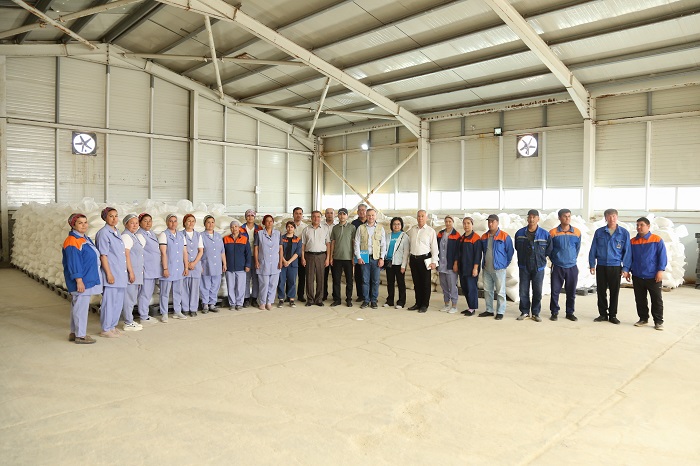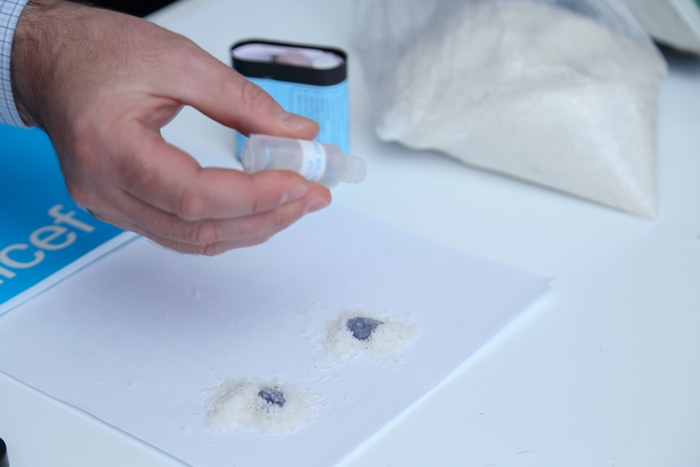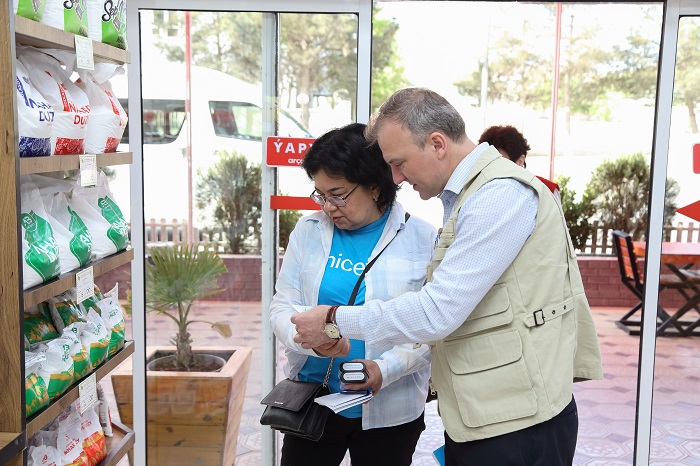 During April-May this year, Ministry of Health and Medical Industry and UNICEF are monitoring the iodized salt production and availability on the markets across the country. UNICEF provided salt test kits to the State Sanitary Epidemiological Service to support salt iodization monitoring system, which allow to conduct rapid and effective salt testing on the spots.
During April-May this year, Ministry of Health and Medical Industry and UNICEF are monitoring the iodized salt production and availability on the markets across the country. UNICEF provided salt test kits to the State Sanitary Epidemiological Service to support salt iodization monitoring system, which allow to conduct rapid and effective salt testing on the spots.
Iodization is the process of fortifying salt for human consumption with iodine and is an effective strategy to increase iodine intake at the population level and prevent Iodine Deficiency Disorders. Iodine is beneficial for the health of people, and it is essential for healthy development of young children. Iodine deficiency can negatively affect women’s and children’s health, economic productivity, and quality of life. It is especially damaging during the early stages of pregnancy and in early childhood.
 In Balkan velayat, the team visited the Guvlyduz salt plant which produces salt for the needs of the whole population of Turkmenistan. The monitoring team observed the entire process starting with the salt extraction from the lake to its purification, iodization, lab quality control, and packaging. The management of the plant and staff understand the benefits of salt iodization for the health of the population and are committed to continue the production of iodized salt to meet the needs of the country.
In Balkan velayat, the team visited the Guvlyduz salt plant which produces salt for the needs of the whole population of Turkmenistan. The monitoring team observed the entire process starting with the salt extraction from the lake to its purification, iodization, lab quality control, and packaging. The management of the plant and staff understand the benefits of salt iodization for the health of the population and are committed to continue the production of iodized salt to meet the needs of the country.
As part of the joint MoHMI and UNICEF monitoring, the team also visited the Sanitary and Epidemiological Service in Turkmenbashy city which conducts monthly iodization tests of salt available on the market and at the production plant. Salt monitoring helps to formulate recommendations to strengthen surveillance system, to maintain quality standards of salt iodization, and to identify the information needs for the suppliers and population.
“UNICEF has been supporting salt iodization programme since 1996 and we are happy to see the continuation of our collaboration with MoHMI in this area to ensure that children and families have the optimum level of iodine consumption for their health and development. Our fruitful collaboration will support to maintain the Universal Salt Iodization status of the country”, said Alexandru Nartea, UNICEF Deputy Representative.
The journey to sustain iodine sufficiency in Turkmenistan is one marked by significant progress in almost 30 years of its implementation.
 Let us step back in time to reflect on the key milestones of salt iodization in Turkmenistan:
Let us step back in time to reflect on the key milestones of salt iodization in Turkmenistan:
In 1996, the President signed a Decree “On Salt Iodization and Flour Fortification with Iron”, stipulating that all locally produced and imported salt for edible purposes must be iodized, setting a level at 23±11.5mg iodine/kg of potassium iodate. Following the Decree, the Government and UNICEF made several investments to improve the manufacturing and iodization technology, and the packaging of iodized salt at the single salt factory Guvlyduz, which sources the KIO3 requirement from the Khazar Factory.
In 2000 with UNICEF and USAID support, a population-representative iodine survey showed that iodine deficiency continued in some areas of the country. In response to the findings of the survey, by the decision of the State Interdepartmental Commission on providing the population with iodized salt and iron-fortified flour, the standard recommended by the World Health Organization and UNICEF was established – 40+/-15 mg of iodine per kg of salt.
In 2004, WHO, UNICEF and International Board for Iodine Deficiency Control certified Turkmenistan as a country which achieved universal salt iodization (USI). In the meantime, UNICEF continued its support with focus on sustainability of the USI monitoring and building the capacity of national health system.
In 2015, the MICS survey confirmed 96.7% households with salt testing 15 parts per million or more of iodate or iodide.
 In 2018, UNICEF facilitated the update of the national monitoring and evaluation guidelines in line with new recommendations followed by capacity building in 2019 of national partners on data quality and supervision of food fortification programs provided by the experts from the Global Iodine Network (IGN).
In 2018, UNICEF facilitated the update of the national monitoring and evaluation guidelines in line with new recommendations followed by capacity building in 2019 of national partners on data quality and supervision of food fortification programs provided by the experts from the Global Iodine Network (IGN).
In 2020-2022, despite the unprecedented challenges posed by the COVID-19 pandemic on health systems, the country continued its efforts to ensure ongoing USI monitoring.
Ensuring the sustainability of iodine sufficiency is important, especially considering the shifting dynamics within the local market, where private entrepreneurs can also offer table salt. It is significant to continue strengthening capacity to ensure the effectiveness of the monitoring system. This ongoing support will enable capturing the changes in production and consumption patterns, identifying emerging trends and take timely action to safeguard the well-being of the population and uphold the long-term success of iodine fortification efforts. ///nCa, 10 May 2024 (in cooperation with UNICEF Turkmenistan)